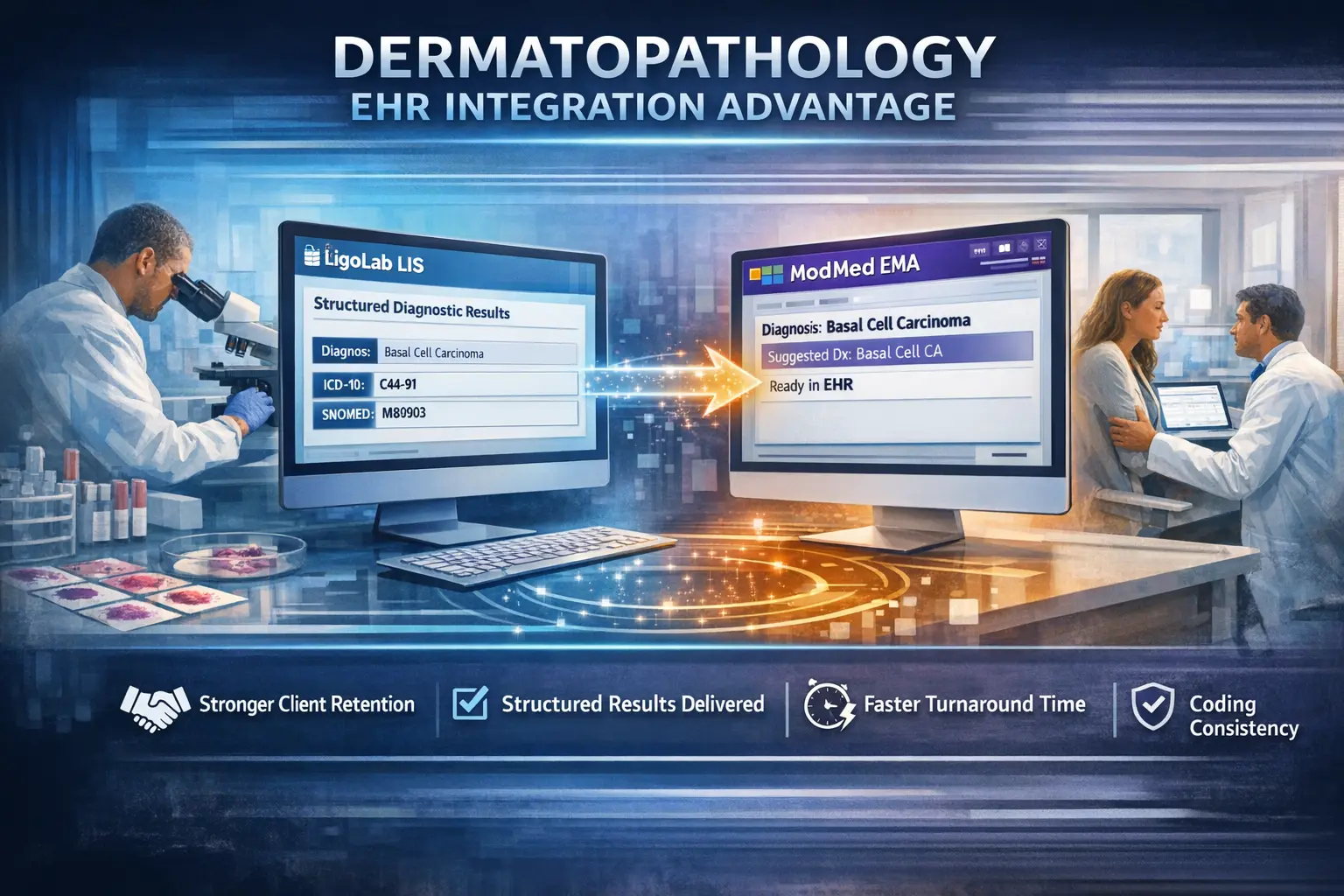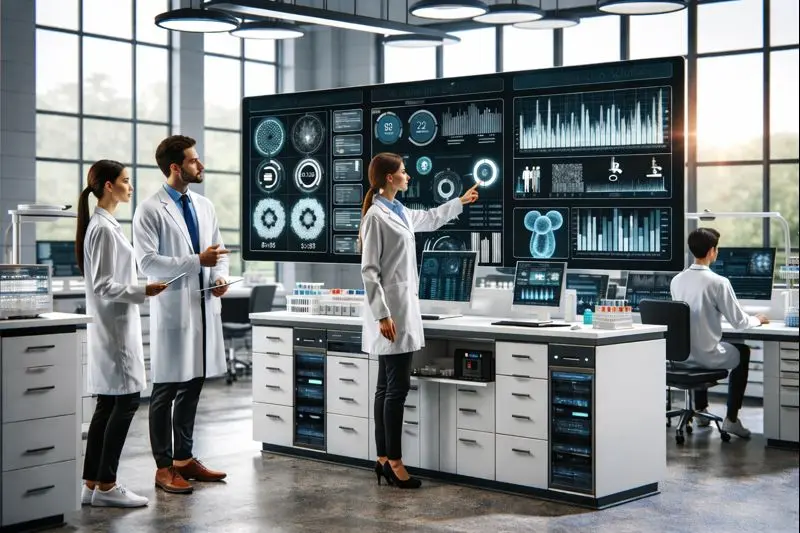Blog
Future of LIS Systems and Personalized Medicine
August 4, 2025
In today’s high-stakes healthcare environment, where every decision can significantly impact patient outcomes, the importance of modern laboratory information systems (LIS systems) has never been greater.
Looking ahead to the future of personalized medicine, it's clear that pathologists, lab directors, managers, and technicians are under mounting pressure. They're racing against time, striving for pinpoint accuracy, and grappling with a constant influx of complex data.
The demand for fast, error-free test results continues to grow, all while labs face the difficult task of integrating cutting-edge technologies into aging LIS software infrastructures.
This article examines how next-generation lab information system platforms, such as the LigoLab Informatics Platform, are rising to meet these challenges and setting new benchmarks. These advanced medical LIS solutions are redefining what pathology lab software can do, ushering in a new era of personalized, precision-driven care.
White Paper: What You Need to Know Before Contracting with a Laboratory Information System Company
What is Personalized Medicine?
Personalized medicine is a revolutionary approach to healthcare that tailors medical treatment and interventions to individual patients based on their genetic makeup, lifestyle, and environmental factors.
How Do LIS Systems and Laboratory Information System Vendors Support Personalized Medicine?
LIS systems and laboratory information system vendors are both crucial in enabling personalized medicine. LIS lab platforms are engineered to manage, analyze, and interpret complex data from various laboratory tests and procedures.
Here are the key ways LIS systems and laboratory information system vendors fit into this evolving landscape:
- Advancements in Technology: Innovations in laboratory information systems driven by artificial intelligence (AI) and machine learning (ML) are unlocking powerful data-driven insights. These technologies enable more accurate diagnoses and support individual treatment plans. Modern LIS software can dramatically reduce diagnostic errors across all phases of laboratory testing and shows strong potential for integrating genomic data to enhance clinical reporting.
- Supporting Clinicians: By integrating these advanced technologies, medical LIS system platforms help clinicians identify patterns and trends within patient data. This support is critical in leading to more targeted and effective treatments.
As LIS systems continue to evolve, their impact on healthcare is profound. It enhances the ability of healthcare professionals to integrate personalized medicine into their practices, leading to:
- Improved Patient Outcomes: The targeted approach enabled by pathology LIS systems leads to better patient care. The efficiency and productivity enhancements brought by the best LIS software, such as automating manual processes and improving accuracy and turnaround times in independent medical laboratories, contribute to this improvement.
- Efficiency in Healthcare: Integrating laboratory information system software into the decision-making streamlines clinical lab workflow and boosts overall healthcare efficiency. By standardizing lab tests and procedures, modern LIS software platforms enhance patient care, minimize human error, and lower operational costs.
Discover More: Pathology Lab Reporting Software: Enhancing Laboratory Efficiency

Embracing Personalized Medicine: The Vital Role of Laboratory Information Systems
While the fundamental role of laboratory information systems in personalized medicine - managing and analyzing complex laboratory data - is established, its evolving role goes beyond these basics.
Here’s how modern LIS software solutions are shaping the future of personalized healthcare:
- Enhanced Data Management: Modern medical LIS platforms are increasingly adept at handling data beyond traditional laboratory results. This includes genomic information, patient history, and lifestyle data, allowing for a more comprehensive patient profile.
- Predictive Analytics and Decision Support: By integrating artificial intelligence and machine learning, today’s LIS systems can process data and provide predictive insights. This helps clinicians anticipate patient risks and outcomes more accurately, leading to proactive, rather than reactive, medical care.
Laboratory Information System Software as a Collaborative Tool in Healthcare
The role of laboratory information system software extends to fostering collaboration among healthcare professionals:
- Interdisciplinary Communication: LIS medical platforms facilitate better communication between different medical departments. For example, integrating LIS system data with an Electronic Health Record (EHR) system ensures that each healthcare team member has the same up-to-date patient information.
- Supporting Personalized Treatment Plans: By delivering comprehensive and precise data, LIS systems empower healthcare teams to develop and refine personalized treatment plans with greater accuracy and confidence.
Discover More: Best Pathology Lab Reporting Software - Buyers Guide and Checklist
Current Challenges and Laboratory Information Systems
The evolving landscape of LIS systems and laboratory information system companies is marked by increasing complexity and the need for more integrated LIS software and pathology lab management solutions.
Let's explore the prominent challenges that labs face today and how the best LIS/laboratory information system companies are addressing them:
Handling Complex Data from Molecular LIS Software Testing
- Legacy LIS in healthcare, originally designed for standard laboratory data, now struggles with molecular testing data.
- The complexity of genetic sequencing and molecular diagnostics requires the handling of large amounts of detailed genomic and proteomic data.
- AI integration into molecular LIS software creates a solution for better data management and analysis. AI enables diagnostic lab software such as LIS systems to handle large volumes of complex data, ensuring more precise diagnoses and tailored treatment plans.
Inefficiencies in Integrating Electronic Health Records (EHR) with Laboratory Information Systems
- Non-standardized data formats and communication protocols can hinder integration between the EHR and the lab information system.
- The importance of such an integration cannot be understated, as issues such as manual data entry and transcription errors directly lead to inefficiencies and preventable medical mistakes.
- Streamlining data exchange and implementing advanced interoperability LIS system software solutions are crucial for enhancing operations and clinical decision-making.
Advanced LIS lab technology addresses these challenges by offering innovative features and comprehensive data management capabilities.
This ability to adapt laboratory report software to the complexities of modern healthcare data ensures efficient integration with EHR systems, making the modern medical LIS a valuable asset in the pursuit of improved patient care and laboratory efficiency.
Discover More: LigoLab Delivers the LIS System Interoperability Needed to Transform Medical Laboratories into Thriving Businesses

The Future of Laboratory Information Systems in Personalized Medicine
The evolution of personalized medicine is intricately linked to the advancements in laboratory information systems.
As personalized healthcare becomes more data-driven, the role of pathology LIS systems in managing and integrating complex data from diverse sources is becoming increasingly vital.
Integration of Molecular LIS Software into Testing
- Revolutionizing Treatment Planning: The fusion of molecular LIS software testing within the industry is a game-changer. By leveraging AI-driven systems, these LIS medical platforms can efficiently handle vast datasets, leading to quicker and more precise diagnoses.
- Personalized Treatment Plans: This integration is pivotal in identifying specific genetic markers, enabling healthcare providers to tailor treatments to individual genetic profiles.
- Data-Driven Decisions: Incorporating molecular lab software test results into the data stream empowers healthcare providers to make informed decisions, enhancing diagnostic accuracy and treatment efficacy.
Cloud-Based LIS Software Solutions for Efficient Data Management & Sharing
- Scalability and Accessibility: Cloud-based LIS healthcare solutions offer the scalability and accessibility essential for modern institutions. They enable effective data management and streamlined sharing across various departments and facilities.
- Real-Time Data Collaboration: Essential for timely patient care, cloud-based medical LIS software solutions facilitate real-time data sharing and analysis, improving decision-making and patient outcomes.
- Seamless Updates and Advanced Features: Cloud-based laboratory information system functions are continually updated, providing testing institutions with the latest LIS lab technology and data management.
In short, the integration of advanced technologies, such as molecular testing into LIS software platforms, along with the adoption of cloud-based solutions, is set to revolutionize personalized medicine.
These advancements enable more accurate treatment planning and efficient data management, leading to better patient outcomes.
The future of healthcare is here, and advanced laboratory information systems are at the forefront of this transformative journey.
Discover More: What is the Best LIS for Molecular Testing Labs?

Clinical Laboratory Management and Its Impact on Healthcare Services & Organizations
With the advancements in laboratory testing and healthcare technology, the demand for efficient and automated clinical laboratory management solutions has never been greater.
For example, LigoLab stands out as a leading provider of pathology software, offering an all-in-one laboratory information system and lab billing platform that fully automates and streamlines laboratory operations.
This innovative medical LIS software solution has significantly impacted healthcare services and organizations, revolutionizing how laboratory testing is conducted and managed.
Discover More: A Closer Look at LigoLab’s Commitment to Innovation
Impact on Healthcare Services
LigoLab has played a significant role in enhancing the efficiency and accuracy of diagnostic lab software, leading to improved patient care and outcomes.
A compelling example is Eastern Connecticut Pathology Consultants (ECPC), which saw a 3x increase in productivity and a 35% boost in net collections after adopting the LigoLab Informatics Platform. These gains directly led to better patient care through faster turnaround times and more informed clinical decisions.
By automating critical processes such as sample tracking, result reporting, and quality control, LigoLab enables healthcare providers to streamline workflows and minimize errors.
For ECPC, the implementation of LigoLab’s unified LIS medical solution significantly improved operational efficiency, ultimately enhancing the patient experience and enabling more timely medical interventions.
Impact on Organizations
Another example is Cole Diagnostics, a laboratory in Utah that achieved increased productivity, cost savings, and improved resource utilization after implementing LigoLab’s laboratory information system as its new pathology lab management solution.
Specifically, LigoLab’s all-in-one LIS software solution streamlined Cole’s client lab billing process.
By automating routine and repetitive lab billing tasks, the LigoLab platform enabled laboratory staff to focus on higher-value activities, leading to improved clinical lab workflow and reduced operational costs.
Additionally, the advanced reporting and analytics capabilities of the LigoLab platform enabled the organization to make data-driven decisions and optimize its laboratory operations for better performance and quality assurance.
Case Study: How Cole Diagnostics Streamlined Client Billing with LigoLab’s LIS & RCM Platform
These two case studies demonstrate how powerful automation and data-driven insights can optimize laboratory operations, enhancing performance and quality assurance.
The Future of Personalized Medicine: Embracing Laboratory Information System Integration
The rise of personalized medicine marks a profound shift. Tailoring treatments to an individual's genetic makeup is more than an innovation - it's a transformation in patient care. The key lies in effectively handling the deluge of genomic data, a demanding task best left for the best laboratory information system software.
Integrating modern laboratory information systems with genomic data and AI-driven healthcare isn't just beneficial - it's essential for the future of personalized medicine, setting a new standard in patient care.
.jpg)







